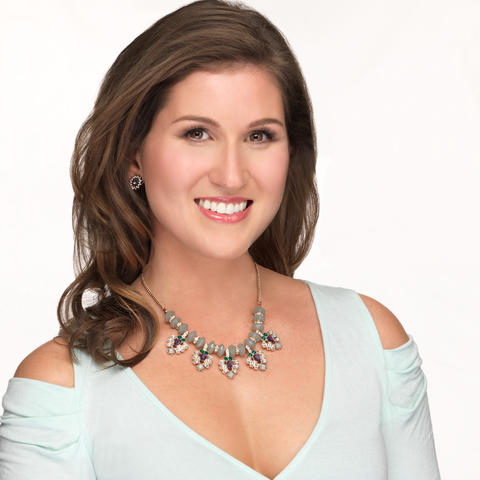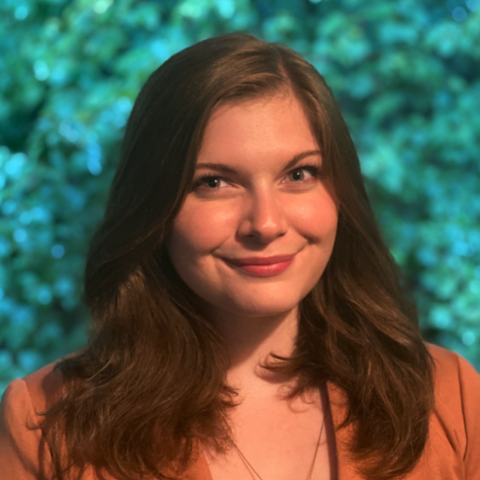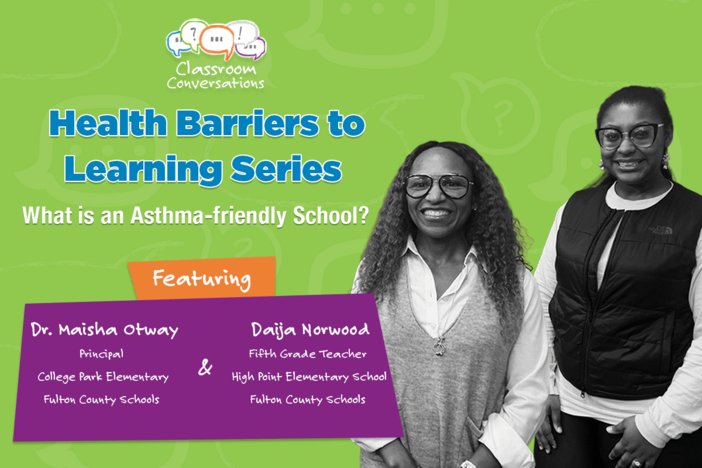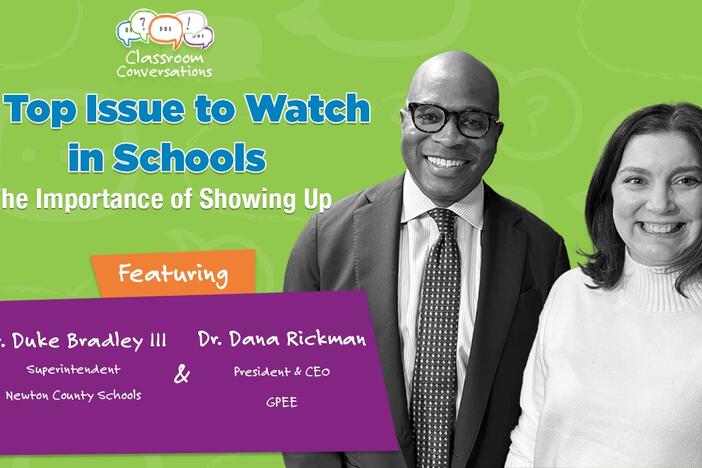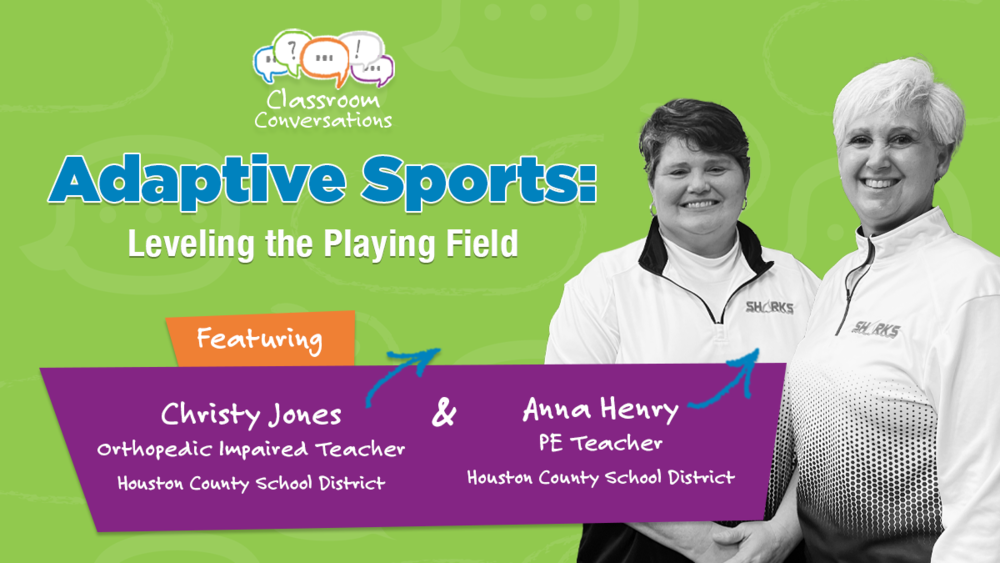
Section Branding
Header Content
Episode 314: Adaptive Sports: Leveling the Playing Field
Primary Content
Georgia students of different abilities are able to share the spirit of athleticism thanks to wheelchair sports. Join us in conversation with Anna Henry and Christy Jones of the Houston County School district to discover how adapted sports is making a difference in the lives of student athletes across the state.

Georgia students of different abilities are able to share the spirit of athleticism thanks to wheelchair sports. Join us in conversation with Anna Henry and Christy Jones of the Houston County School district to discover how adapted sports is making a difference in the lives of student athletes across the state.
TRANSCRIPT
Ashley Mengwasser: Hello, educators, Classroom Conversations fans, Classroom Conversations MVPs. Just get ready for some sporty lingo, it's coming. I'm podcast veteran Ashley Mengwasser. Happy to tee up another wonderful episode of Teacher Talk. Classroom Conversations is presented jointly by the Georgia Department of Education and Georgia Public Broadcasting. Welcome to the platform for Georgia's teachers. Let the games begin. Rocky, Rudy, The Blind Side. There's nothing more universally stirring than a sports story featuring an overcomer, because we want to win and we want to see athletes with heart surmount tough odds to taste glory. In school sports, every student, regardless of physical ability, can be an athlete with adapted sports or wheelchair sports. And that's the subject of our conversation today. For students with disabilities, we'll hear how the American Association of Adapted Sports Program in Georgia is benefiting them, providing small and large moments of glory. Uh-oh, I've got two sharks circling me in studio today. Representing Houston County's adapted sports team, the Sharks, are coaches Christy Jones and Anna Henry. Christy is a special ed teacher and itinerant teacher serving students with physical disabilities throughout Houston County. And Anna Henry teaches K through five PE and Health at Langston Road Elementary in Perry, Georgia. Welcome, Christy and Anna. How are you guys?
Christy Jones: Doing great.
Anna Henry: We're great.
Christy Jones: Thank you.
Ashley Mengwasser: What is your personal connection to sports? We'll start with you, Anna.
Anna Henry: Well, I teach, like you said, kindergarten through fifth grade PE, and so I get to see the kids on a certain level of activity in the classroom and then I get to coach with the Sharks, so that connects me. I also have kids that I have from my school that are on the team, so that has been a fun part of coaching so far.
Ashley Mengwasser: That is nice. And where does the interest in sports come from your background?
Anna Henry: Well, growing up in a very small spot in South Georgia, that was our go-to. We played sports. My parents did make me play because I was so shy, but I learned to enjoy more of it when I got to coach once I got out of college. The Sharks is my thing.
Ashley Mengwasser: And here you are.
Anna Henry: Here I am.
Ashley Mengwasser: You've chosen coaching and education. Christy, what is your personal connection to sports?
Christy Jones: Very similar to Anna. Living in a small town, grew up, and that gave me my socialization, and just being a part of a team and feeling like a part of a family. And so coming into adaptive sports, we've made a family for our players. And I started out coaching able-bodied sports. I coached fast pitch softball and soccer at the middle school I was a counselor at before I became a special ed teacher. And then I transferred over to adaptive sports.
Ashley Mengwasser: Wow. Okay. Well, I want to hear about you and your own lives, so maybe a couple of stats on each of you. Christy, you first, give me two cool stats about you and your life.
Christy Jones: Coaching wise, our program has won 31 state championships in 15 years.
Ashley Mengwasser: That's incredible.
Christy Jones: And before I started adaptive sports, I was selected to coach a world game softball team for the Georgia Special Olympics, and I was able to go and participate against other countries.
Ashley Mengwasser: Oh, that's incredible.
Christy Jones: And my team won a gold medal there.
Ashley Mengwasser: Oh my gosh, Christy.
Christy Jones: Yeah.
Ashley Mengwasser: Gold medalist in the studio. Where was that competition?
Christy Jones: It was in 1996 when the Olympics were in Atlanta.
Ashley Mengwasser: Okay.
Christy Jones: We actually held our world games in North Carolina, so we got to travel there.
Ashley Mengwasser: Incredible. Wow. Congratulations. Anna, what are two stats about you?
Anna Henry: Oh, goodness. Well, this is my 31st year teaching and I have been with the Sharks for six years. And I was excited to be pulled on by Christy and one of our other coaches, Stephen Roberson.
Ashley Mengwasser: They recruited you?
Anna Henry: Sort of, kind of, yeah.
Christy Jones: Absolutely.
Anna Henry: It's been a fun ride.
Ashley Mengwasser: Good. Only a fun ride. What are the actual adapted sports that you teach in your county?
Anna Henry: We do handball, basketball, and football, in that order. Handball in the fall, followed by, we're in basketball right now, and then football will start even next week for JV.
Ashley Mengwasser: Incredible.
Christy Jones: Some of our athletes actually participate on their track teams at their schools and they can do wheelchair or ambulatory, which is our athletes that stand, can stand and run. They have those divisions now at the GHSA level.
Ashley Mengwasser: What is your favorite to coach and what is your students' favorite to play?
Christy Jones: My favorite to coach is basketball because I love the strategy of the game, the excitement they get into. Their favorite hands down probably is football because they get to bang around and just really have fun and learn new verbiage and terminology and everything. They really like to hit.
Anna Henry: I'll be honest, I think they like to bang around in all three sports.
Christy Jones: Yeah.
Ashley Mengwasser: All the sports, Anna says.
Anna Henry: But I think that my favorite to coach is handball, although I knew nothing about it when I started, and I think I'm more knowledgeable with basketball. But I think just coming in with something new and learning a new sport makes it fun for me.
Ashley Mengwasser: Describe handball.
Anna Henry: Handball is sort of soccer-esque. They have a goal similar to soccer that they have to score in, and they can use their feet as long as they don't touch the floor, but they...
Christy Jones: Pass the ball instead of kicking it.
Anna Henry: They pass the ball.
Ashley Mengwasser: Pass the ball.
Anna Henry: They dribble and pass. Yeah.
Ashley Mengwasser: Okay. All right. Describe the makeup of the Sharks, the team, what age, what grades?
Christy Jones: We are lucky. We're one of the only systems in the state right now that has two teams. We have a JV and varsity. Our JV has as young as the second grade and goes to ninth grade. And our varsity has ninth through 12th graders.
Ashley Mengwasser: Okay. And how many on your team, Anna?
Anna Henry: We have 12 on each team right now.
Ashley Mengwasser: Okay. And they play each other?
Anna Henry: No. We have the JV division and they have the varsity division.
Ashley Mengwasser: Excellent. Tell me about what other counties or school systems you guys can compete against, because I was surprised to learn this isn't in all 159 of Georgia counties, but it sounds like it could be, and we'll talk more about that. But what counties have these programs?
Anna Henry: There's ours, Houston County, there's Muskogee, there's Troup, there's DeKalb, Gwinnett.
Ashley Mengwasser: Clayton.
Anna Henry: Atlanta City and Clayton. And the Middle Georgia RESA is bringing on a new team.
Christy Jones: Griffin RESA.
Anna Henry: Griffin RESA.
Christy Jones: In the Henry County area will have a team.
Ashley Mengwasser: Do they have a mascot as cool as the Sharks?
Christy Jones: We're the coolest.
Ashley Mengwasser: Of course.
Christy Jones: Absolutely.
Ashley Mengwasser: Naturally.
Christy Jones: But no, Georgia Storm is the RESA team.
Ashley Mengwasser: I think that's good.
Christy Jones: Gwinnett Heat, Clayton Eagles, Muskogee Lions, DeKalb Silver Streaks. Atlanta Public Schools are the Wolf Pack.
Ashley Mengwasser: The Wolf Pack. That was my high school mascot when I went to Buford.
How are adapted sports different from Special Olympics? Or are they?
Christy Jones: They are different in that our athletes have physical disabilities, but not necessarily the cognitive issues, intellectual disabilities. Our students are actually eligible to move on and play at the college level.
Ashley Mengwasser: Wow.
Christy Jones: We've had five of our athletes go to college on scholarship to play at Minnesota and...
Anna Henry: Arizona.
Christy Jones: Arizona.
Ashley Mengwasser: Oh, good schools.
Anna Henry: Actually, the one that went to Arizona, she also tried out for the...
Christy Jones: Paralympics.
Anna Henry: Paralympics and was an alternate one year.
Ashley Mengwasser: What did she play?
Anna Henry: Basketball.
Christy Jones: Basketball.
Ashley Mengwasser: Basketball.
Anna Henry: Well, she played all three, but it was basketball for Paralympics.
Ashley Mengwasser: For her scholarship. And must these students be wheelchair users for the duration of their day to participate in adapted sports?
Anna Henry: No. If you saw our team, most of them walk into the gym for practice and walk out just like we would, but we have four who are in wheelchairs most of the day, if not all day.
Ashley Mengwasser: Then why participate on an adapted sports team?
Christy Jones: Well, they do have medical conditions that affect either their bones or their muscles that prevents them from playing with able-bodied peers. To make the playing field level for everyone, that's why we play in wheelchairs. Because we have students that are amputees, we have students that have muscular dystrophy, cerebral palsy, scoliosis, which causes the leg length difference. Everyone is equal if we put them in a chair.
Ashley Mengwasser: Brilliant. Starting from the ground.
Christy Jones: Right.
Ashley Mengwasser: Like you said, the same foundation. How does your teaching area intersect with adapted sports?
Christy Jones: I'm an orthopedic impaired teacher for my county, basically every one of my students that I work with, I recruit.
Ashley Mengwasser: Look at that.
Christy Jones: To the team.
Ashley Mengwasser: Of course, you do, Christy. You're out building your roster.
Christy Jones: Also, the great part about our program is because a lot of our students, they're spread out over our county. It's not just one school. A lot of our students would never cross paths without having this sport. And so it helps me in that it builds a network, and the students help each other, they support each other. "Hey, I'm having a hard time in this class keeping my notes because of a physical disability," and here's another student that goes, "I did this. This is how I got around that."
Ashley Mengwasser: They're solution sharing as part of this little community?
Christy Jones: Absolutely. And our team is problem solvers. Usually when I go into a classroom, one of my kiddos will go, "Hey, I'm having a problem with this, but I think this might help me." They've already figured it out and given each other that support and the family network there.
Ashley Mengwasser: Anna, teaching PE and health, how does that intersect with adapted sports?
Anna Henry: A lot of my kids come in and everything's fine. I have had some kids that have the orthopedic issues and I have been able to call Christy and say, "Hey, I've got this kid," or I've been able to call one of our other coaches who is our adaptive PE teacher and say, "Come in and look at this kid with me and help me figure out what you'd do." Right now, I have a kid who is not able to participate in PE because of an orthopedic issue, and we got his medical statement changed to be in a wheelchair, or one of our sports chairs, while he participates in PE. Without that, he would've been several, several months without any physical activity. And his family's so excited that he may be one of our future Sharks.
Ashley Mengwasser: Look at that. Always recruiting. I love that. What sets this program apart, AAASP? You guys have been in it for a while. Why do you think it works so well?
Christy Jones: We're the only type of program like this in the nation as far as being in the school systems. It's an interscholastic framework. AAASP and GHSA work very closely together to provide training for coaches, training for officials. They give us our schedules. AAASP actually helped us get our foundation grant to buy the wheelchairs and buy the equipment, they're three to $4,000 a piece.
Ashley Mengwasser: Expensive.
Christy Jones: Yeah. I started as an official 20 years ago and then I moved into coaching and helping get the program started in Warner Robins. And through just being around the AAASP personnel and getting trained and everything really helped our program grow.
Anna Henry: And let's be honest, she was the mastermind behind the Sharks, honestly.
Ashley Mengwasser: Is that true, Christy?
Christy Jones: I was one of the starters, yes.
Ashley Mengwasser: One of the starters. Congratulations on all you've accomplished with this. It's an inimitable program, as you've pointed out. Now you've got other counties following suit probably because of the benefits. Let's transition to that. What does this program mean for the students participating?
Anna Henry: I think like any kid, many of them wanted to participate on a regular team.
Ashley Mengwasser: Right.
Anna Henry: And this gives them the opportunity to get off the sideline and into the game like our logo is. And so it's just fun to see them be a part of something that they thought they may never be a part of.
Ashley Mengwasser: And here they are.
Anna Henry: And go so far with it.
Ashley Mengwasser: How is it benefiting them, Christy?
Christy Jones: Just that network, like we talked about, supporting each other, giving them a family, being a part of a team. You see their confidence and their independence and you see the parents look at them in a different light.
Ashley Mengwasser: Oh, I never thought about that.
Christy Jones: Because a lot of our athletes are born with medical issues and so they see them as their fragile baby and then they get out there and they start playing and having fun and competing. It's very competitive. And they get to see their child like that, like every other child in their county. Our students earn their letterman jacket, just like their peers in their school. We have five championship rings.
Anna Henry: But to get a ring, they'd have to win all three sports in a season.
Christy Jones: Right.
Ashley Mengwasser: Oh, I see.
Christy Jones: We decided to set a little challenge for ourselves.
Ashley Mengwasser: There you go.
Christy Jones: Our system is so supported. The principals, the administration, the board office, when they win a championship, they get recognized at the board office. When they win a game, the principals are talking about it over the intercom system, just like the football team or the track. And so they get recognized and they're recognized as athletes. And so that pride of being a Shark just translates through everything that they do.
Ashley Mengwasser: You want to be a triple threat and win three sports. Those are some pretty lofty athletic goals. How is this affecting their academic success?
Christy Jones: Well, just like any other athlete in our county, they have to pass to play. If your grades are going down, then you are benched, basically.
Ashley Mengwasser: Yeah.
Christy Jones: And it helps us because we hold them accountable. If you're going to be a Shark, this is what our expectations are. And we've had several parents tell us that it improved their attendance in school, it improved their grades. And just being a part of that family of adaptive sports has helped them tremendously.
Ashley Mengwasser: Right. To use a shark pun, they've got their teeth in it now.
Christy Jones: Absolutely.
Ashley Mengwasser: Absolutely. Anything to add to that, Anna?
Anna Henry: Just beyond the academics, I think even just being respectful to everybody, including family members and team members and everything, it all draws together. And I think we as a team, a group of coaches, a group of athletes, and a group of parents that are working together, it's going to be positive and have a positive impact on their academics and every other part of their lives.
Ashley Mengwasser: What is the impact on the school as a whole from participating in something like this?
Anna Henry: I would say at my school, we have three athletes that are my students, and they're always wearing their swag, as you say, and they love to talk about their games and their wins. And they've done an incredible job during basketball right now. But when they start talking it up, I have other students coming, "Hey, how can I get on your team? How can I get on it?" And I was like, "Well, we'll see if you qualify." It's been fun to see that in kids and they want to be a part of a winning team.
Ashley Mengwasser: Does anything happen to the culture of the school as a result of an adapted sports program?
Christy Jones: Honestly, it's our system-wide, it's not just one school, but the awareness of, okay, you see someone that may be a wheelchair user during the day, don't make assumptions that they can't do something. And as far as our community, our community supports us too, and they know who the Sharks are and recognize us. But the school system and the teachers in the schools, the awareness of, "Hey, this young man's an athlete, he can go further. I need to push him. I don't need to make that assumption because he's in a wheelchair that he can't do something." And I think that's our biggest victory there.
Anna Henry: I think one of the most fun things that we have done other than just coach period was our fundraiser games.
Christy Jones: Yes.
Anna Henry: Where we had the Sharks and Minnows and then we've even played against the Macon Mayhem, the hockey team.
Ashley Mengwasser: Oh, yeah. They're incredible.
Anna Henry: They would come in and they would have their chairs and it's almost like you could see on their faces, "Okay, we're these professional athlete guys."
Ashley Mengwasser: "Can we do this?"
Anna Henry: "And we need to take it easy on these kids." And then they're like, "Oh my goodness. These kids are killing us."
Christy Jones: We let them score four points.
Anna Henry: And then with the Sharks and Minnows game, we have administrators from the board office come in and some principals and they'll play against the kids. And several of the kids have had fun flipping them out of chair.
Christy Jones: Yeah.
Anna Henry: It's good. It's a good family.
Ashley Mengwasser: Like the sports movies I mentioned in the introduction, we all love an inspiring story. I'm sure each of you has one in the annals that you can think of. Can you share at least one of your inspiring success stories with us?
Anna Henry: Well, we have this player right now, she's an up-and-coming great athlete. She's going to be good. And she's still young with us, but she has had to sit out some of basketball because she had to have surgery. We're always getting tickled at all the kids, but her mom said when she was coming out of her anesthesia and her doctor was trying to talk to her, he was like, "Are you okay?" She goes, "When can I get back to practice?"
Ashley Mengwasser: That's the first thing she said.
Christy Jones: It's a win.
Anna Henry: She's all good.
Ashley Mengwasser: She's hooked too. Do you have a story, Christy?
Christy Jones: My story is a young man, he was in the eighth grade and super athlete, able-bodied athlete, played football, baseball, basketball. And in the eighth grade, he had a stroke. And it just changed his life overnight that he went from being able to run and walk with everybody to not being able to use the left side of his body overnight. And the interesting thing was my dad was actually in the hospital and his grandmother was my nurse. Or his nurse, not my nurse. And I had left and my dad was talking to her, telling her what I did. And she goes, "Oh my God, I need to talk to her."
Ashley Mengwasser: Really?
Christy Jones: And because he was going through a great depression. They really were worried that he was suicidal because he missed out on the sports and being a part of a team. And he came, tried out for our team, turned out to be one of our best athletes, did everything one-handed. He was amazing. And he's gone on, he's graduated, he's working, he has a family now.
Ashley Mengwasser: Wow.
Christy Jones: He comes back to the games and lets me see his little girl and his grandmother still stays in touch with me. And it changed his life.
Ashley Mengwasser: That is inspiring.
Christy Jones: Being a part of that.
Ashley Mengwasser: Talk about an overcomer. Are there any barriers to participation in this? If so, what are they?
Christy Jones: The limited amount of teams we have right now in Georgia. We're hoping that it'll grow. AAASP has grants to help anybody start a team, any county that's interested in starting a team. We fundraise to buy our equipment. And that's really the biggest barrier is getting funding on that.
Ashley Mengwasser: To get the wheelchairs?
Anna Henry: And just to get the word out period.
Christy Jones: Yeah.
Anna Henry: We had the opportunity to present at a couple of the PE conferences, the Georgia SHAPE Conference in Athens and the Share the Wealth Conference in Jekyll. And the schools have been very receptive. A lot of the colleges, we would love to get into some of them to teach those PE teachers and educators what we do. And hopefully it would trickle down from there and we could get some more teams in the state because we really, really need them. We keep seeing this state, this state, this state has an adaptive program on the college level, Georgia needs one.
Ashley Mengwasser: Right.
Anna Henry: Georgia needs one somewhere.
Ashley Mengwasser: To borrow a popular athletic company's slogan, just do it.
Anna Henry: Just do it.
Christy Jones: Absolutely.
Ashley Mengwasser: It feels like just getting it in place is the biggest part because you've shared with us today how beneficial this can be. What is your final rallying cry for parents, for teachers, for school systems to not wait, to start this immediately, to get in the game?
Anna Henry: I would say if you haven't seen any of our games, come out.
Ashley Mengwasser: There you go.
Anna Henry: And just be a part of it. Our games are free for admission, except for the state basketball championship in Macon in two weeks.
Ashley Mengwasser: Well, they're out winning championships, somebody's got to pay for those rings.
Anna Henry: But I think if they could just come out and watch a game, they would be hooked. I was hooked at the first banquet I went, right after they asked me to coach, and to just see these kids talk to each other and be thankful that they are part of the team and this is their family. If the parents could see that, they couldn't turn back.
Ashley Mengwasser: What do you say to folks listening?
Christy Jones: It is one of the most rewarding things I've done in my life and life changing for me and my athletes. And I would love to see the program go around the state. Everyone deserves an opportunity to do anything they want to do. And playing in the team or being a part of it, just being a manager, is life changing for some students. And I think anybody should have that door open for them.
Ashley Mengwasser: Hear, hear. Well, I know I'm going to go to a game. I'd like to ask where I can get some Shark swag.
Christy Jones: I will mail you some.
Ashley Mengwasser: I would be interested in that so I can come to the game.
Christy Jones: Yeah.
Ashley Mengwasser: Thanks for having a ball with us today, Christy and Anna.
Anna Henry: Thank you so much.
Ashley Mengwasser: Really appreciate it. You two are a true ally for Houston County. Hope they know that. Educators, just one more episode left, and we hope that this has been a winning season for you. Before the buzzer sounds, I want to remind you of this: You're a great teacher. I'm Ashley. Come back next week for our finale as I retire my season three jersey. Goodbye for now. Funding for Classroom Conversations is made possible through the School Climate Transformation Grant.


